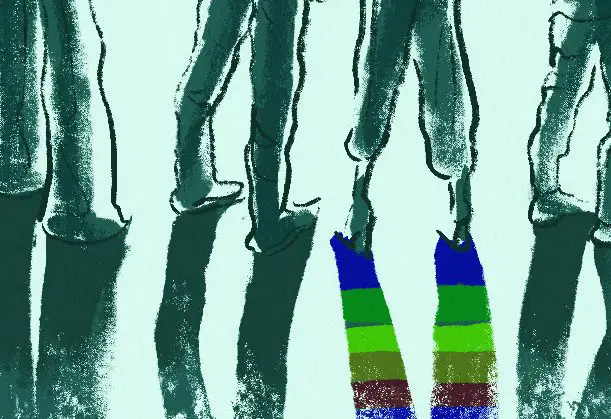The gay experience includes a number of known hallmarks that differentiate it from that of straight people’s: for one, straight people never have to come out as straight. Where heterosexuality is the norm, gay people come as curveballs who are forced to declare and then explain their presence.
However, a regularly occurring phenomenon that’s much more of a curveball to gay people (and that straight people know and talk little about) is “passing” as straight.
In a nutshell, straight-passing signifies that, on the surface, a gay person isn’t immediately identifiable as gay in the way people traditionally view gays; as a result, the outside world reads them as straight. Not everyone will pass as straight, and even for the people who do the phenomenon is inconsistent, as it depends heavily on the person identifying them and to what degree they have their finger on the pulse of gay culture.
Very often, straight people aren’t hip to the nuances gays use to express their sexuality in their appearance, so they’re much likelier to miss important clues that suggest orientation.
For instance, the average person could likely correctly identify Olympic figure skater Adam Rippon as gay, whereas skier Gus Kenworthy’s being gay might present more of a head-scratcher.
Rippon fits people’s traditional image of gay men – flamboyant, effeminate, sassy – while Kenworthy, on the other hand, eschews many of those stereotypes. To straight spectators, Rippon represents the classic gay while Kenworthy is gay lite.
The unfortunate side-effect of straight-passing is that it calls your queerness into question – within yourself, in front of your community – all because you don’t fall into the narrow caricature that informs the perceptions of those outside your group.
To straight people, gays who pass as straight blend right in and have earned their spot at the heteronormative table. They’ve assimilated successfully, and are the most palatable of their kind – that is, not the in-your-face militant gays Ann Coulter warned of who sashay through Mike Pence’s nightmares, but rather the chill, vanilla, bearable, borderline bro-y NPH-types.
The gay’s reaction to discovering their ability to straight-pass is often contingent upon their situation in life – whether they’re generally unconcerned with harassment, or they’re closeted for their own protection. If the former, straight-passing is largely an annoyance, as it can take time to feel pride in your sexuality and being told “You’re not gay enough” is a serious knock.
After all the self-exploration and acceptance it can take to come out, having someone question your orientation feels like having something stripped away from you. However, if your situation is less secure, you may be grateful that your safety’s not compromised.
A lot of us grew up feeling that way and, for me, there’s absolutely still a sense of relief that comes with straight-passing; I might not be holding onto a secret any longer, but the kid in me who remained undiscovered, happily.
It’s only been recent, in fact, that my personal capacity to straight-pass has come to my attention. In 2018 alone, though, I can count half a dozen times where I was as gay as ever and the straight people around me were none the wiser.
At brunch three separate times, just one girlfriend and I, we were brought a single check without being asked. At a party, a former college basketball player began a conversation with me before characterizing our chat as us “just bro-ing out” to his nearby girlfriend (despite me having made it a point to not bro out post-middle school). On New Year’s, someone’s boyfriend felt safe describing anything remotely bad as “gay,” since no apparent gays were in sight.
More poetically, I was at a gay bar once last month when one patron had to drunkenly request for clarification – “Are you straight?” – before any sexual conquest was pursued. Several times, too, my definitive straight BFF – the Dorothy to my Tin Man – has had family members ask of me and her, “Why don’t you just date him?” A real “will they or won’t they” situation.
The assumption that I’m on the market for women is textbook heteronormativity, and its application here is based on my appearance as a man who, by all standards, should have heterosexual desires: I’m tall, have facial hair, a deep voice and a wardrobe made for leisure for Christ’s sake.
But, by trying to assign the label “gay” to anything outside of homosexuality itself, straight people have always missed the mark on what’s “gay” and what’s not. My queerness can’t be deduced from anything except itself, and it lives in harmony with everything “straight” I do.
Straight people, it’s time to deactivate your “gay-dar,” time to stop assessing gays based on heteronormative ideals and time to start taking people as they are.

















